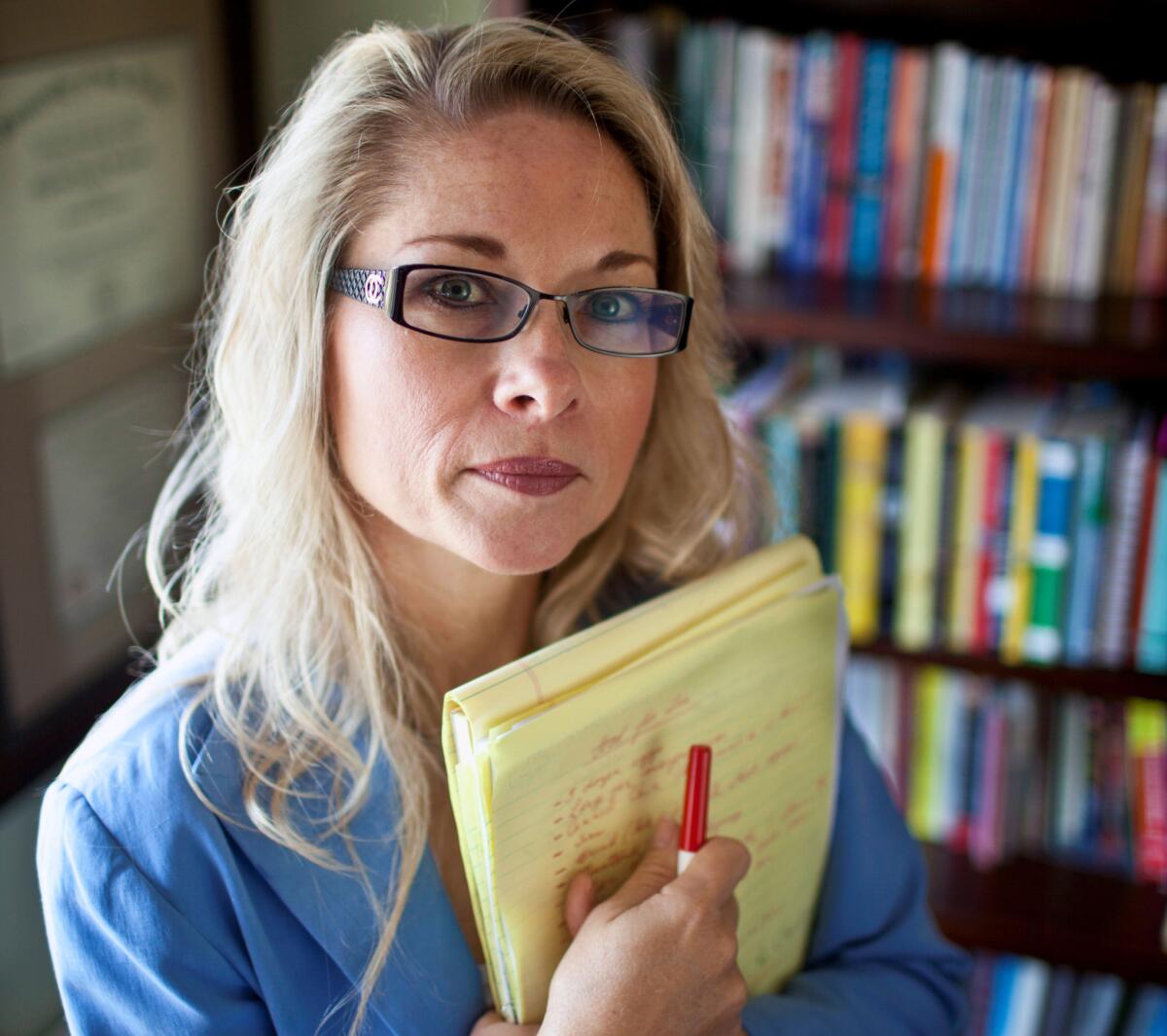Editorial: Should nonunion teachers be forced to pay dues?

Lead plaintiff Rebecca Friedrichs, an Orange County public school teacher, poses for a portrait in 2013.
- Share via
On Monday, the Supreme Court will be urged by a group of disgruntled California public-school teachers to rule that the state is violating the 1st Amendment by requiring them to contribute to the teachers union even though they have opted not to be members. The court, which has flirted with this spurious notion in recent years, should resoundingly reject that advice and reaffirm its 1977 ruling upholding such “fair share” arrangements.
The case of Friedrichs vs. California Teachers Assn. is the latest installment in a long legal campaign to undermine public-employee unions, and it comes at a time when those unions are under fire for the generosity of the benefits they negotiate (especially in relation to those available in the private sector) and for their political influence. Teachers’ unions in particular — and not just in California — are being faulted for inflexibility and resisting reform. The plaintiffs in this case refer in their brief to “this era of broken municipal budgets and a national crisis in public education.”
But the issue before the court isn’t whether teachers’ unions are beneficial or harmful. It is whether the 1st Amendment prohibits California and other states from requiring public employees who choose not to join the union — but who benefit from agreements the union negotiates — to help defray the costs associated with collective bargaining.
The system works this way: Once a union has been chosen by majority vote to represent all employees, workers who decline to join are nevertheless assessed a fee to cover costs related to negotiations over wages and working conditions. But they can opt out of paying additional fees related to the union’s political activities by requesting a rebate.
The Supreme Court upheld “fair share” payments in the 1977 case of Abood vs. Detroit Board of Education, but some conservative members of the court have been angling to overturn that precedent.
The argument for overturning Abood is based on a misreading of the 1st Amendment. Essentially the plaintiffs are arguing that requiring them to pay a fee to support collective bargaining on their behalf is a form of unconstitutional “compelled speech” about political matters. In their brief, they say that “it is difficult to imagine more politically charged issues than how much money local governments should devote to public employees, or what policies public schools should adopt to best educate children.”
This is an ingenious but unconvincing argument. As state Atty. Gen. Kamala Harris points out, it ignores the Supreme Court’s “longstanding recognition that constitutional analysis differs when the government acts as employer, rather than regulator.”
Even when it acts as an employer, government can’t ignore the 1st Amendment. But it may balance the free-speech rights of employees with other interests — in this case, the advantages of preserving labor peace and preventing a situation in which some employees are “free riders” who benefit from contracts negotiated by the union without bearing any responsibility for defraying the costs associated with representation.
That doesn’t mean that an employee may not exercise his 1st Amendment right to criticize the union or the policies it pursues at the negotiating table. That employee also can campaign for a majority vote to decertify the union. Alternatively, an employee who opposes the union’s negotiating agenda can join the union and press for new leadership.
In addition to challenging the “fair share” system, the plaintiffs are making a backup argument, also based on the 1st Amendment, that even if nonunion members must pay fees associated with collective bargaining, they may not be charged for the union’s political activities unless they affirmatively “opt in” to making such payments.
As we have observed before, paying for a service performed at the bargaining table is easily distinguishable from paying for political activities. As a matter of policy, we would prefer that nonunion members be required to “opt in” to subsidizing political activity. But we’re not persuaded that system is required by the 1st Amendment.
The vastly more important issue in this case is whether the Supreme Court will undermine the ability of unions to effectively represent all of their workers at the bargaining table. The court should refuse to do so and reaffirm the Abood decision.
Follow the Opinion section on Twitter @latimesopinion and Facebook
More to Read
A cure for the common opinion
Get thought-provoking perspectives with our weekly newsletter.
You may occasionally receive promotional content from the Los Angeles Times.









